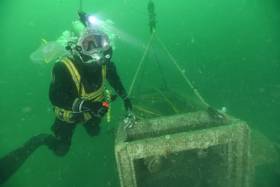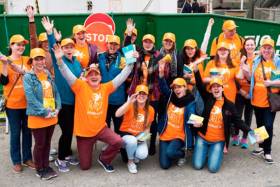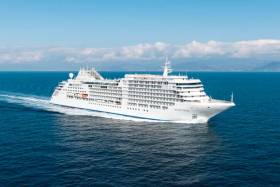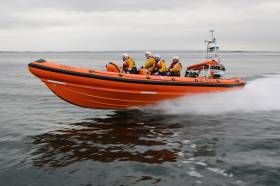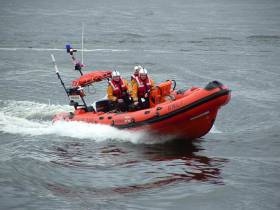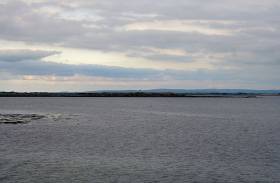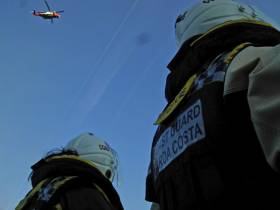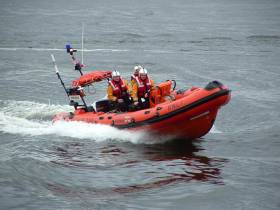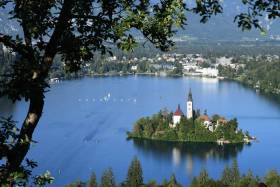Displaying items by tag: Galway
#MarineScience - The SmartBay Observatory in Galway Bay will be brought ashore for essential maintenance in the coming days.
Last week Ocean Crest Marine, with diver Mark Kerrigan, prepared for the recovery of the underwater observatory, located 1.5 km off the coast of Spiddal, which has been continuously monitoring the underwater environment over the past 15 months.
It uses cameras, instruments and sensors for continuous live underwater observations giving marine scientists and other ocean researchers unique real-time access to monitor ongoing changes in the marine environment.
Over the coming weeks, the observatory will be thoroughly cleaned, all the scientific instruments will be replaced, and new underwater lamps will be added to improve the high-definition video camera footage.
“We also plan to install a microplastics sampling net and a new underwater stills camera in partnership with European marine science researchers,” said Alan Berry of the Marine Institute.
These research projects are due to commence mid-July, when the observatory will be reinstated, to continue to collect important information on the marine environment from the depths of Galway Bay.
The SmartBay Observatory in Galway Bay contributes to a growing global network of real-time data capture systems deployed within the ocean.
Data relating to the marine environment at the site is transferred through a fibre-optic cable to the Marine Institute headquarters and onwards onto the internet.
This data includes a live video stream, the depth of the observatory node, the sea temperature and salinity, and estimates of the chlorophyll and turbidity levels in the water which give an indication of the volume of phytoplankton and other particles, such as sediment, in the water.
Volunteers Wanted For SeaFest 2018
#SeaFest - Volunteers are wanted for Ireland’s largest maritime festival, SeaFest 2018, taking place in Galway Harbour from 29 June to 1 July.
“A wide range of organisations and agencies come together to take part in this festival, including businesses across Galway,” says Johnny Donnelly, managing director of event managers Arcana. “Our festival volunteers also play an incredibly important role in making SeaFest one to remember, and also help us to showcase Galway at its best.
“We encourage those with an interest in the marine or those proud of Galway city, to apply to volunteer for SeaFest 2018. This is a unique opportunity to be involved in one of Ireland's biggest maritime festivals and help raise awareness about the value of our seas.”
SeaFest 2018 offers a packed programme of family-friendly events on and around the water which aim to engage the young and the young at heart in the magic and mystery of the ocean.
Enjoy thrilling performances from world champion flyboarders, boat trips along Galway Bay, as well as the chance to try kayaking and sailing in Galway Harbour.
There will be inspiring talks from award-winning wildlife cameraman Doug Allan, as well as seafood cookery demonstrations, tours of ocean-going vessels, an equipment display from the Defence Forces and interactive activities for the kids.
To become a volunteer for SeaFest 2018, complete the online application form. Applications will close on Friday 8 June.
All volunteers must be aged 18 years or older. Volunteers have the option to volunteer for one, two or the three days of the festival. Volunteers may also be selected for Garda vetting.
For more information on the festival, follow SeaFest on Facebook, Twitter and Instagram.
See also: ‘Investing in Marine Ireland’ is the theme of the 2018 Our Ocean Wealth Summit taking place before SeaFest.
Silver Muse Is Galway’s First Cruise Call Of 2018
#CruiseLiners - Galway’s first cruise call of 2018 is the Silver Muse currently anchored off Mutton Island, as Galway Bay FM reports.
The flagship of Silversea Cruises made her maiden Irish port of call off Dunmore East last September, just months after her launch in Monte Carlo.
Despite its more than 40,000 gross tonnage, the “ultra-luxury” Silver Muse accommodates a total of under 600 ‘guests’ and almost as many crew.
#OurOceanWealth - Former President of Ireland Mary Robinson has been confirmed as keynote speaker for this year’s Our Ocean Wealth Summit, taking place in Galway on Thursday 28 and Friday 29 June.
Now in its fifth year, the Our Ocean Wealth Summit forms a key part of the Government’s integrated marine plan Harnessing Our Ocean Wealth. The summit is a key event for the marine sector and related industries, offering a platform for discussion on the future of Ireland’s marine sector.
This year, the summit will extend across two days with a packed programme of presentations as well as panel discussion, interactive sessions and networking events.
Galway Docks will host the event, expected to attract more than 500 national and international delegates from across the marine sector.
The largest gathering of Ireland’s marine and business communities, the Our Ocean Wealth Summit attracts high-profile speakers from across the globe, not only from the marine sector but from a wide-range of disciplines.
This year’s keynote speaker is Mary Robinson, the seventh President of Ireland and the first woman to hold the office. In 2010 she established The Mary Robinson Foundation – Climate Justice, a centre for thought leadership, education and advocacy on the struggle to secure global justice for people vulnerable to the impacts of climate change.
Other key speakers will include former Nasa astronaut Kathryn Sullivan, who was appointed by US President Barack Obama as Under Secretary of Commerce for Oceans and Atmosphere, and National Oceanic and Atmospheric Association Administrator (NOAA). Sullivan has a long career as a distinguished scientist, astronaut and oceanographer.
Producer of BBC’s award-winning Blue Planet II series Orla Doherty is also one of the highlights of the summit programme. With family roots on the Donegal coast, Doherty has had a strong connection to the sea. She is an expert in underwater filming and has filmed scientists at the frontline of ocean discoveries from Indonesia to the Arctic Circle.
This year’s theme is ‘Investing in Marine Ireland’ and the summit will focus on progress towards the Government’s ambitious targets to double the value of the blue economy by 2030.
The diverse programme planned for this year’s Summit reflects strong collaboration between Bord Iascaigh Mhara, Bord Bia, Enterprise Ireland, IDA Ireland, Fáilte Ireland, Science Foundation Ireland, Marine Institute and the Sustainable Energy Authority Ireland, with individual sessions addressing environmental, economic and societal opportunities and challenges to creating a sustainable ocean economy for Ireland.
The Our Ocean World Summit coincides with Ireland’s national maritime festival, SeaFest 2018 in Galway from Friday 29 June till Sunday 1 July.
Galway Lifeboat Rescues Man After Dinghy Capsizes
#RNLI - Galway RNLI rescued a man who got into difficulty after his dinghy capsized on Galway Bay yesterday afternoon (Sunday 18 February).
The incident happened off Hare Island shortly before 1pm, when a member of the public saw the man was unable to right the 15ft vessel and notified the Irish Coast Guard, who requested the assistance of the RNLI lifeboat.
Galway’s inshore lifeboat launched from Galway Docks at 1.15pm and located the man as he was swimming towards the shore. He was cold and shaken by his ordeal, and the lifeboat crew brought him to the station to administer first aid.
The man recovered a short time later and did not need to be hospitalised.
Galway RNLI subsequently retrieved the dinghy and towed it safely back to Galway Docks, ending the rescue operation at 2.15pm.
Deputy launch authority Barry Heskin advises members of the public to dress adequately for the weather conditions and to always notify a family member or friends of expected time of arrival.
The volunteer lifeboat crew on this callout were Dave Oliver, John O’Sullivan, Ros Forde and Kenneth Kitterick.
Galway Lifeboat Rescues Fisherman With Hand Injury
#RNLI - Independent.ie reports that a fisherman with a hand injury was hospitalised after his rescue from a trawler off Salthill by Galway RNLI yesterday afternoon (Saturday 9 December).
The volunteer lifeboat crew launched within 10 minutes of the alarm being raised and soon met the fishing boat offshore, where they treated the wound before taking him to a waiting ambulance at Galway Docks.
Body Found In Search For Missing Galway Fisherman
#Missing - Emergency responders recovered a body a last night (Thursday 23 November) in the search for a missing fisherman off Galway.
The body was found on the shore in Oranmore Bay, some five nautical miles east of where a fishing boat was discovered adrift yesterday hours into the search.
As previously reported on Afloat.ie, the major air and sea operation was launched after a fisherman was reported missing on Wednesday night.
RTÉ News says the body found last night was brought to University Hospital Galway for a post-mortem examination and identification.
Search Off Galway For Missing Fisherman
#Missing - RTÉ News reports that a major air and sea rescue operation has been launched for a fisherman reported missing off Galway last night (Wednesday 22 November).
A fishing boat was found adrift with no occupant west of Blackrock in Salthill shortly after the search resumed at first light this morning.
RNLI lifeboats from Galway and the Aran Islands are involved in the search with the Shannon-based Irish Coast Guard rescue helicopter in the search, and they have since been joined by local fishing boats.
Galway Lifeboat Rescues Two Stranded By Tide On Hare Island
#RNLI - Two people are recovering after being rescued by Galway RNLI when the tide trapped them on Hare Island, as the Connacht Tribune reports.
The lifeboat launched at 6.41pm yesterday evening (Wednesday 13 September) to reports from passers-by on Renmore beach of people trapped on the tidal island.
With Declan Killilea was at the helm and crewed by Olivia Byrne, Ian Murphy, and John O’Sullivan, the lifeboat was at the scene five minutes later to recover the pair, who were uninjured but shaken by their ordeal.
Both rescued are visitors to the area, prompting Galway RNLI to urge caution to those who may not be familiar with the local tides.
Strandings are not uncommon at Hare Island, with similar incidents in 2010, 2013 and most recently last year.
In other news, Galway RNLI is hosting an open day at its lifeboat station in Galway Docks this Sunday 17 September from 1pm to 4pm. Fire and Rescue Galway, which shares volunteers with the lifeboat service, will also be in attendance.
Irish Crews Win at World Masters Regatta
#Rowing: Irish composite crews had good wins on the first day of the World Masters Regatta in Bled in Slovenia. The Irish B eight (average age 36 or more), which is formed from six clubs won. Two fours in the E class (average age 55 or more) also won – the Galway/Neptune combination by just .26 of a second. The decision was initially given to their German opponents.
World Masters Regatta, Bled, Slovenia, Day One (Selected Results; Irish interest; all heats of 1,000 metres, winners only)
Men
Eight, B (avg 36 or more) – Heat Five: Galway, Commercial, Shandon, Clonmel, Neptune, Cork 3:05.51.
Four, E (avg 55 or more) – Heat One: Galway, Neptune 3:26.26.
Heat Four: Waterford, Neptune, Commercial, Belfast BC 3:28.1



























